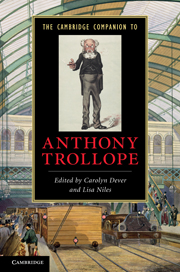Book contents
- Frontmatter
- Introduction
- 1 Trollope’s Literary Life and Times
- 2 Trollope As Autobiographer And Biographer
- 3 Trollope’s Barsetshire Series
- 4 The Palliser Novels
- 5 Trollope Redux: The Later Novels
- 6 Trollope’s Short Fiction
- 7 Trollope And The Sensation Novel
- 8 Queer Trollope
- 9 The hobbledehoy in Trollope
- 10 The construction of masculinities
- 11 Vulgarity and money
- 12 Trollope and the law
- 13 Trollope and travel
- 14 Trollope and the Antipodes
- 15 Trollope and Ireland
- 16 Trollope and America
- Further reading
- Index
- Cambridge Companions to . . .
7 - Trollope And The Sensation Novel
Published online by Cambridge University Press: 28 March 2011
- Frontmatter
- Introduction
- 1 Trollope’s Literary Life and Times
- 2 Trollope As Autobiographer And Biographer
- 3 Trollope’s Barsetshire Series
- 4 The Palliser Novels
- 5 Trollope Redux: The Later Novels
- 6 Trollope’s Short Fiction
- 7 Trollope And The Sensation Novel
- 8 Queer Trollope
- 9 The hobbledehoy in Trollope
- 10 The construction of masculinities
- 11 Vulgarity and money
- 12 Trollope and the law
- 13 Trollope and travel
- 14 Trollope and the Antipodes
- 15 Trollope and Ireland
- 16 Trollope and America
- Further reading
- Index
- Cambridge Companions to . . .
Summary
“Among English novels of the present day, and among English novelists, a great division is made,” Trollope famously argued in An Autobiography:
There are sensational novels, and anti-sensational; sensational novelists, and anti-sensational; sensational readers, and anti-sensational. The novelists who are considered to be anti-sensational are generally called realistic. I am realistic. My friend Wilkie Collins is generally supposed to be sensational . . . All this I think is a mistake . . . A good artist should be both, – and both in the highest degree.
(A ch. 12)Trollope drafted An Autobiography in 1875–76, when the critical consensus in favor of “higher realism” had been established for some time. His chapter on “English novelists of the present day” stresses the social and moral responsibility of the novelist, setting the leisurely unfolding of events over striking effects, and pitting “the elucidation of character” over “the construction and gradual development of a plot.” “When I sit down to write a novel I do not at all know and I do not very much care how it is to end,” Trollope observes. “Wilkie Collins . . . plans everything on, down to the minutest detail, from the beginning to the end . . . The construction is most minute and most wonderful. But I can never lose the taste of the construction” (A ch. 13).
There may be an element of truth in Trollope’s contrast between himself and Collins: between his own dense, multiple plots dominated by an overarching authorial persona and the latter’s use of multiple voices and contrasting forms of narrative testimony. But his use of such contrasts is primarily rhetorical and, throughout his writing career, Trollope increasingly draws on “sensational” techniques. As Walter M. Kendrick has argued, “opposites are always economically interrelated” in Trollope’s fiction, which works “in shifting, dynamic relation to the cliche´s of his contemporaries.”
- Type
- Chapter
- Information
- The Cambridge Companion to Anthony Trollope , pp. 85 - 98Publisher: Cambridge University PressPrint publication year: 2010



